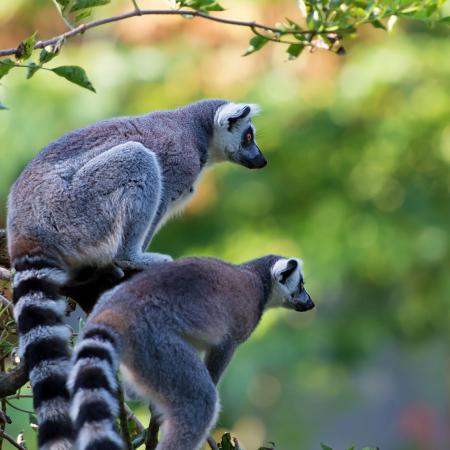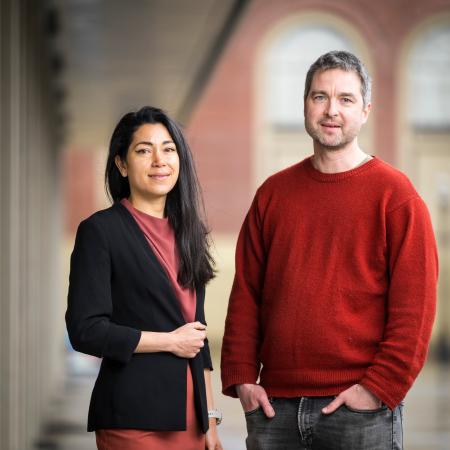Coral cell biologist Virginia Weis’s career has traveled the arc from foundational cell biology research to a dogged quest for solutions to prevent the destruction of corals and ensure their preservation in the future. For more than two decades, her research has focused on the symbiotic association between corals and the algae they harbor within their cells, and the role of this mutualistic relationship in the foundation and sustenance of healthy coral reef ecosystems. An internationally recognized leader in coral symbiosis cell biology and the Head of the Department of Integrative Biology, Weis was named a 2019 Distinguished Professor at Oregon State University.
Distinguished Professorship is the highest academic honor the university can bestow on a faculty member. Among other accomplishments, the award recognizes her significant contributions to enhancing the understanding of the effects of climate change and environmental stress on the coral immune response and coral bleaching.
Weis joins chemistry Professor Mas Subramanian and ocean ecology Professor Clare Reimers who were also chosen as 2019 Distinguished Professors for their extraordinary scholarship, as well as their outstanding teaching and mentoring of undergraduate and graduate students. The award also acknowledges their contributions to OSU’s land grant mission through their service, outreach, and engagement. The College of Science has the most distinguished professors at OSU at 22.
“It is a huge honor. It is a great feeling to know that I am being recognized for working hard at OSU all these years, teaching students, and making an impact on my field,” Weis remarked.
She will present a distinguished lecture as a part of the Recognizing Excellence events on May 13 in the Memorial Union Horizon Room.
Taking action against coral bleaching
Coral reefs are in crisis around the world, threatened by ocean warming, which causes corals to expel algae and turn white in a process called coral bleaching. Photosynthetic algae are responsible for the beautiful colors of corals and also for providing food to the coral hosts in exchange for protection and nutrients. Coral bleaching, which results from the breakdown of this symbiotic relationship, can cause 100 percent coral mortality and reef destruction.
In her laboratory, Weis and her graduate students closely examine the molecular partnership between corals and algae, their communication and signaling patterns that regulate the symbiosis, and how dysbiosis or a breakdown in partnership results under conditions of stress induced by heat and environmental pollution. Weis’s research on coral-algae symbiosis and its effect on the coral immune system is supported by a National Science Foundation (NSF) award.
“It is very interesting that the primary cause of coral bleaching and reef destruction is global warming, which is a big-scale problem. But the effect occurs at a micro-scale, cell biology level that results in the whole ecosystem breaking down. My research group is invested in understanding how that breakdown occurs and the reasons for it,” Weis said.
In addition to her research on the molecular and cellular conversations between symbiotic partners, Weis is investigating methods to create a more resilient coral through gene editing techniques. “Proposing radical genetic changes as a solution may sound frightening to some. But we are going to lose corals in 20 years if we don’t try something new.”
Weis’s research accomplishments garnered her the prestigious NSF EDGE grant in 2017. In fact, she and her collaborators were the first cohort of NSF’s EDGE awardees. EDGE stands for Enabling Discovery through Genomic Tools. The NSF’s Biological Sciences Directorate administers the program, which funds projects that seek to develop new tools and teach other researchers how to use them.
“I am working hard to help bring leadership and consensus to the challenge of building coral repositories. This is so that when humans get their act together and we bring the temperature back down on the planet, then we could scale the reproduction of corals and try to build reefs up again.”
Weis’s research is supported by a $2 million NSF EDGE award. She leads a team of coral biologists, cell biologists and geneticists from Stanford, the Carnegie Institution and Florida International University. The team studies a small sea anemone called Aiptasia as a proxy for corals. It engages in a symbiosis with algae just like corals and can survive better than corals in a lab. Corals are slow-growing in the lab and difficult to obtain because of their endangered status in many locations. The research focuses on developing genomic and gene editing techniques in both partners to be able to test hypotheses about the involvement of specific genes in coral health and stress.





